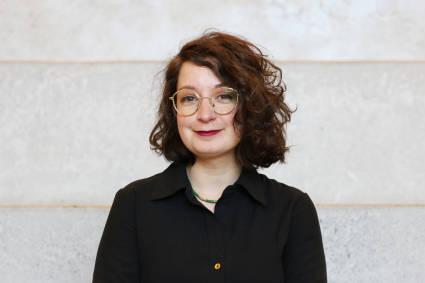Bélinda Crobeddu
Ph.D. biology, 2023
Research Advisor, Collège Montmorency
“INRS was a revelation for me. I felt like a person and not just another number among thousands.”
Right from the start of our conversation, Bélinda Crobeddu emphasizes her atypical academic background, which she sees as a real asset and which has enabled her to develop several essential skills.
Bélinda's initial ambition was to become a laboratory technician, which led her to obtain her brevet de technicien supérieur (BTS) in France. However, it was during these studies that she developed a keen interest in toxicology and understanding the impact of the environment on human health. This new impetus prompted her to deepen her knowledge, gradually specializing in environmental toxicology, and crowning her efforts with a Master's degree in Environmental and Health Toxicology. Despite her initial desire to pursue a doctorate, the complexities of the French education system steered her course towards Québec, where she initially undertook a PhD at UQAM.
A meeting by chance at a conference with Géraldine Delbès and Isabelle Plante, both professors at the Centre Armand-Frappier Santé Biotechnologie (AFSB), prompted her to make the leap to INRS. Bélinda chose to start a new PhD with Professor Isabelle Plante. "I consider myself lucky that Isabelle took the risk of guiding a student with an atypical background like mine. She continues: “Initially, my entire toxicology career focused on pollution, airborne particles and the respiratory tract. Then I found myself working on the mammary gland, an organ I knew very little about. This introduced a whole new dimension to toxicology, as it's a hormone-dependent organ, bringing a unique complexity.ʺ Being naturally passionate about challenges, Bélinda welcomed this new perspective with enthusiasm.
At the Centre AFSB, she discovered a truly unique campus, marked by distinctive hues that she attributes to its isolation away from major centers. A place she describes as “made for herʺ. She expresses her gratitude for the constant support she has received throughout her time at INRS, both from her thesis supervisor and from the entire administration and management. She is confident that the intimacy of the campus fosters an atmosphere conducive to listening and taking individual needs into account.
It is thanks to her strong sense of belonging and social commitment that Bélinda was heavily involved in so-called extracurricular activities. In particular, she was behind the creation of a new and unique financial support during parental leave program at INRS, an idea she put to the center's management during her student pregnancy, and which led to its realization. In her words, “the introduction of this financial assistance is a testament to INRS's attentive eye for the needs of its community.” It is important to note that INRS is the only university in Québec to offer such support.
She also helped create the popular science journal La Synthèse, produced by students from all four centers. Bélinda explains: “My active participation in other activities has greatly enriched my career. Not only did I carry out laboratory research, I also diversified my experiences. This has enabled me to acquire invaluable skills, such as team management, scientific popularization and communication, and marketing. These skills have undeniably influenced my career choice.” She emphasizes the support of her thesis supervisor, whom she describes as “a special gem at INRS” and who recognized that these activities are beneficial to students.
Today, Bélinda is a research advisor at Collège Montmorency in Laval, where she plays an essential role in the development and implementation of scientific research at the college level, and in encouraging young people's interest in scientific careers. “And yes, there is scientific research going on in CEGEPs! It's still a little-known field, but one that's expanding rapidly.” This challenge is a source of motivation for Bélinda, who sees herself more involved in research administration. “There are no limits in research,” she says. “I enjoy the challenges of research in a college environment, where recognition of the quality of research is a challenge from the outset. I like the administrative side of it, all the management behind the scenes. Everything can change very quickly.” Her collaborative approach facilitates the process and helps create an environment conducive to innovation and the success of the projects she and her team set up.
At the end of our interview, Bélinda expresses her wish to encourage students to get more involved and broaden their perspectives during their studies. She points out: “It's a great way to build a network of contacts and develop transferable skills. My own involvement in these activities has been extremely beneficial, both in terms of personal and professional developmentʺ, she concludes.
[Interview conducted in december 2023.]

